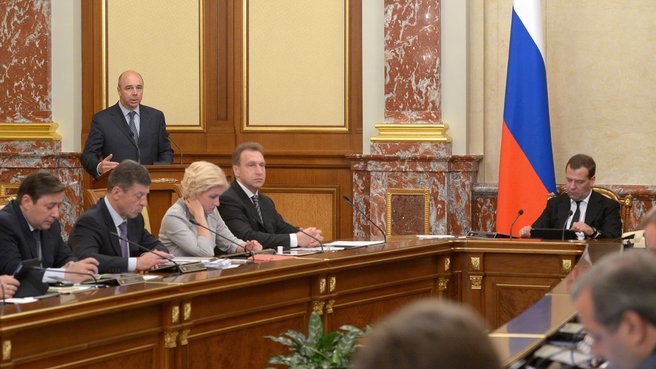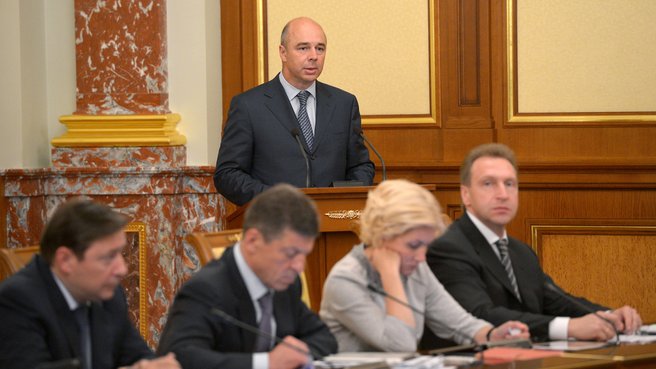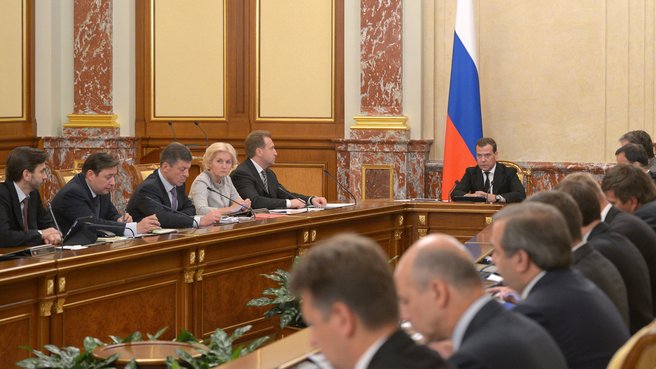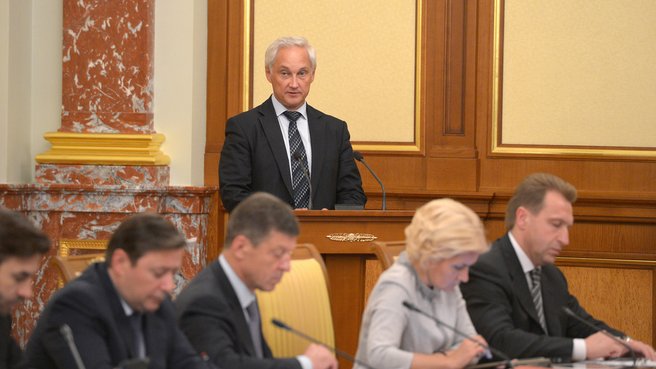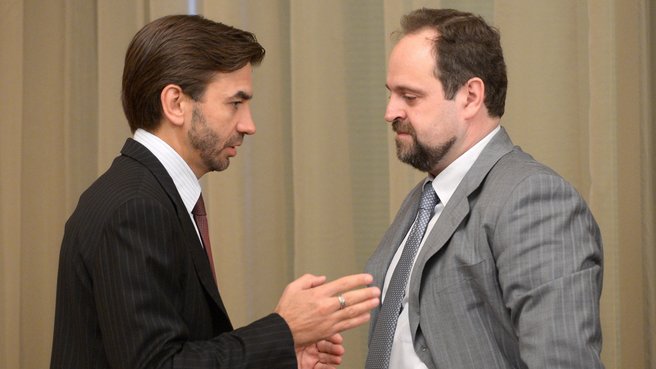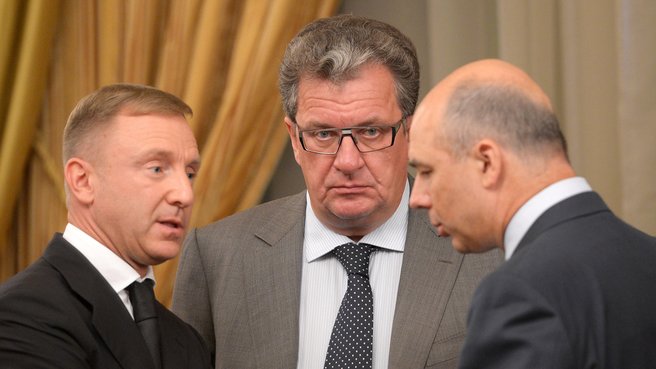Agenda: Results of the federal budget execution and the progress of the federal targeted programmes and the Federal Targeted Investment Programme in the first quarter of 2013, and nine other issues.
Transcript:
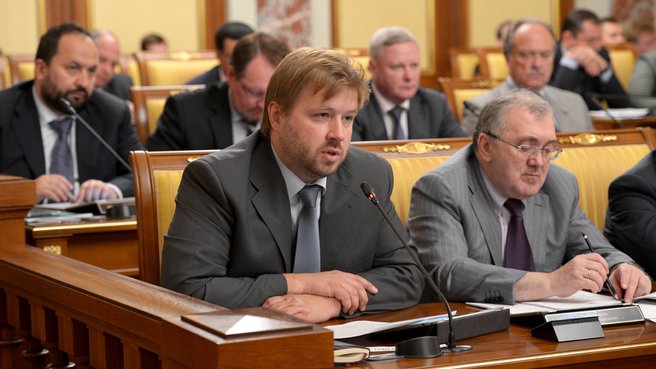
Member of the Government Expert Council and First Deputy Head of the Government Analytical Centre Vladislav Onishchenko and Deputy Minister of Defence Ruslan Tsalikov
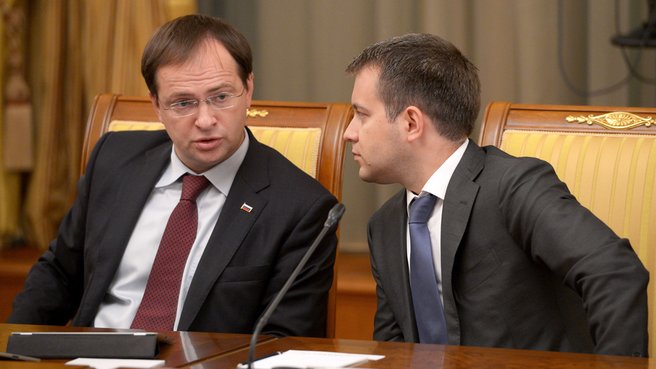
Minister of Culture Vladimir Medinsky and Minister of Communications and Mass Media Nikolai Nikiforov
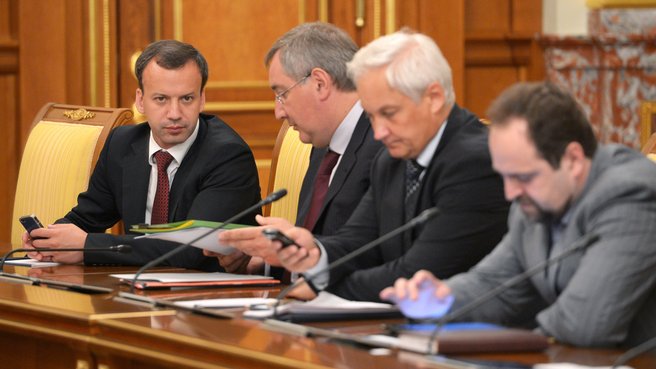
Deputy Prime Minister Arkady Dvorkovich, Deputy Prime Minister Dmitry Rogozin, Minister of Economic Development Andrei Belousov and Minister of Natural Resources and Environmental Protection Sergei Donskoi

Minister of Regional Development Igor Slunyayev, Minister of Natural Resources and Environmental Protection Sergei Donskoi and Minister of Energy Alexander Novak
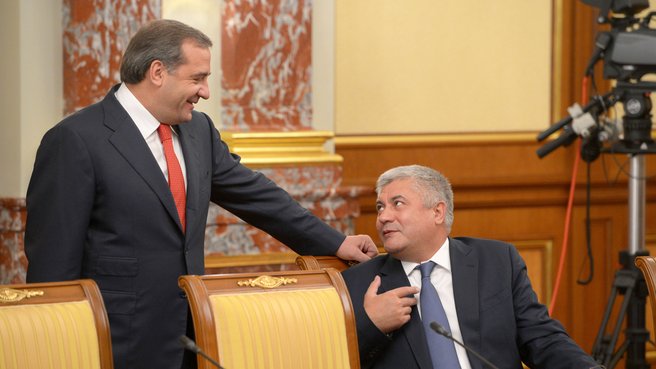
Minister for Civil Defence, Emergencies and Disaster Relief Vladimir Puchkov and Minister of the Interior Vladimir Kolokoltsev
Finance Minister Anton Siluanov reports at the Government meeting
Dmitry Medvedev: Good afternoon. First, I would like, as usual, to say a few words about our agenda. This meeting has been rescheduled as a result of my business trips, which is why we are meeting so often. Maybe it's a good thing that issues aren't allowed to accumulate.
In late May, at a Government meeting we approved a report on the implementation of the 2012 federal budget. We will now examine the implementation of the federal budget, federal targeted programmes and the Federal Targeted Investment Programme in the first quarter of 2013. Our colleagues who are responsible for these issues will give more detailed reports, and I will only quote some statistics.
Russia's GDP is estimated at about 15 trillion roubles. Revenues have increased by 10.5% and total 3.1 trillion roubles. This exceeds our forecast and is definitely not bad. Oil and gas revenues total 1.5 trillion, and so-called non-oil and gas revenues stand at 1.6 trillion roubles. Expenditures are also estimated at 3.1 trillion roubles. The budget deficit is still quite small, at about 60 billion roubles. Public debt has fallen by over 180 billion roubles compared to January 1, 2013. Our safety cushion, including gold and foreign currency reserves and the National Wealth Fund, have increased by 723 billion and 6 billion, respectively. On the whole, the budget execution process in the first quarter ensured macroeconomic stability for our economy and the fulfillment of social obligations, which are an absolute priority for us.
Dmitry Medvedev: "Our safety cushion, including gold and foreign currency reserves and the National Wealth Fund, have increased by 723 billion and 6 billion, respectively. On the whole, the budget execution process in the first quarter ensured macroeconomic stability for our economy and the fulfillment of social obligations, which are an absolute priority for us."
I would like to say a few words about the Federal Targeted Investment Programme and federal targeted programmes. The 2013 budget sets out over 1 trillion roubles for implementing 47 federal targeted programmes and 2 state programmes, while the investment programme is to receive about 870 billion roubles. I would also like to point out that cash expenditures have increased to almost 24% during the implementation of the state budget. This shows that the budget execution process has become more uniform. At the same time, expenditures in the first quarter under the Federal Targeted Investment Programme remained about the same as last year and at a level at which this, unfortunately, always happens in Russia. In this respect, the same 7% shows that the situation is not satisfactory.
I would like once again to draw the attention of all ministers to the need for spending budget allocations evenly over the year, and not just during the fourth quarter, which, unfortunately, happens here. Not only am I drawing your attention to this, but, as has been agreed, we will hold a meeting on this issue in the near future. All the necessary conclusions and proposals will be made during the upcoming meeting. And I would like to mention several draft laws. The first deals with export control procedures for shipments of dual-purpose products. Our task is to simplify and speed up existing control procedures and encourage the delivery of Russian corporate high-tech products and inventions to foreign markets. This is an important issue. Nevertheless, if necessary, we must abide by all the required control procedures and keep an eye on the situation.
We will examine amendments to the Tax Code and the law On Credit Cooperation. To date, Russia has about 3,000 loan cooperatives and 2,300 micro-finance corporations, which fulfill an important mission and which issue loans to small businesses. It is largely owing to them that Russian citizens can obtain start-up capital when they launch their own businesses. And, if necessary, they can borrow additional loans without excessive bureaucratic formalities. At the same time, these companies have the same status as major banks during the calculation of the profit tax base. This is probably not completely justified. Therefore we suggest that the specifics of calculating the incomes and expenditures which constitute the profit tax base for these companies be formalised in accordance with the law. I hope that will enable them to work better and accumulate the required reserves. And, of course, most importantly, this will help expand the scale and volume of loans for small businesses.
Let’s start discussing the agenda, including the results of the budget execution, the federal targeted programmes and the Federal Targeted Investment Programme in the first quarter. First, I would like to give the floor to Minister of Finance Mr Siluanov, followed by Minister of Economic Development Mr Belousov, and then we will also hear from other colleagues.
Anton Siluanov: Mr Medvedev, colleagues. During the first quarter, the federal budget was implemented in conditions which, compared to the corresponding period in 2012, was marked by somewhat slower economic growth and by reduced global crude-oil prices. I would like to mention the following two statistics. Russia posted 4.8% and 1.6% growth in the first quarter of 2012 and 2013, respectively. First-quarter oil prices totalled $117.2 and $111 in 2012 and 2013, respectively. Certainly, this influences budget revenues and expenditures. The main federal-budget implementation parametres totalled 3,105 trillion roubles in revenue, or 24.1% of revenue volumes stipulated by federal law On the Federal Budget. This trend is more positive because, over the corresponding 2012 period, we obtained revenues totalling 23% of annual revenue volumes.
As for expenditures, we spent 3,167.8 trillion roubles, or 23.5% of spending volumes stipulated by budget estimates. Last year’s spending was less substantial, at 23.3%. This is a positive development. The non-oil and gas deficit was 10.5%, or 1.2% less than the corresponding 2012 period. I am happy to note that, over the past five months of 2013, the non-oil and gas deficit totalled 9.7% of the GDP, as compared to 10.8% over the same five months of 2012. First-quarter federal-budget revenues exceeded those for the corresponding 2012 period by 139.3 billion roubles. At the same time, non-oil and gas revenues increased by 180 billion roubles. These additional proceeds are mostly linked with the influx of lump-sum severance-tax payments, and income from the repayment of subsidy-and-subvention balances, which were listed among budget revenues. In addition, we indexed alcohol and petroleum excise-tax rates, which brought in additional revenues.
Anton Siluanov: "The main federal-budget implementation parametres totalled 3,105 trillion roubles in revenue, or 24.1% of revenue volumes stipulated by federal law On the Federal Budget. This trend is more positive because, over the corresponding 2012 period, we obtained revenues totalling 23% of annual revenue volumes."
As compared to our cash plan, oil and gas revenues increased by 60 billion roubles due to the favourable price situation, as compared to our planned targets. We exceeded our planned targets somewhat.
As for even spending, it should be noted that, over the past two years, the balance of federal-budget expenditures has, on the whole, increased as compared to budget estimates on the accounts of independent and public-sector institutions. In effect, we are posting some nice and even spending, but all allocations being transferred by the chief budget-funding distributor to specific recipients are accumulated at independent and public-sector institutions. And here are some statistics: As of January 1, these balances totalled 107 billion roubles, and they reached 331 billion roubles on May 1. What does this mean? This means that we must also ensure more even spending below, that is, at public-sector institutions and our budget recipients.
I would like to say a few words about the allocation of maximum budget-obligation volumes. We note this indicator all the time. As of April 1, this allocation of maximum budget-obligation volumes was somewhat worse than a year ago. In all, 62.9% of maximum volumes were allocated during the first quarter, and the relevant 2012 volumes were 63.9%. This means that we are lagging somewhat behind our 2012 levels. A similar situation was posted over the first five months of 2013. In all, 68.6% of maximum annual volumes were allocated by the main distributors of budget funding. And last year’s figure was over 73%. Nevertheless, it can be noted that maximum budget-obligation volumes as regards budget investment are being allocated considerably better. These allocation levels are 15% higher than the corresponding 2012 quarter.
And now I would like to say a few words about budget allocations, the maximum budget-obligation volumes of which were not approved, for lack of regulatory documents. This, too, hampers the rhythm of financing. I would like to note that the Ministry of Agriculture must improve its performance. Of the 59 billion roubles that we did not allocate for lack of a regulatory document, the Ministry of Agriculture is responsible for 28.5 billion. First of all, this means subsidies to support economically important regional programmes in the livestock-breeding sector and other subsidies for supporting the agro-industrial complex. We have passed amendments to the 2013 budget, and these amendments also require the adoption of the relevant regulatory documents.
Spending in the amount of 62.7 billion roubles has been put on hold due to the lack of such regulations. The Ministry of Agriculture should make 16.8 billion roubles of additional funding that have been allocated as a result of amending the law On the Budget available to the corresponding recipients of budget funds, and the Federal Railway Agency should put together a decision to increase its contribution to Russian Railways so that we could release the funding.
Anton Siluanov: "The surplus of the consolidated regional budgets amounted to 261 billion roubles. Twenty-nine regions experienced budget shortfalls, whereas 54 regions had a surplus."
Mr Medvedev, with regard to the execution of the consolidated budgets of the Russian regions, the total revenue of the Russian regions fell by 1.7% as of June 1 as compared with the corresponding period of 2012, which is mostly due to a decline in profit tax revenue which, in turn, is due to reduced corporate revenue and profitability. This tax has become very volatile. Over the first four months of 2013, profit tax collection across Russian regions was on the rise. It fell sharply in May. We hope that things will improve and profit tax collection will get back to normal. The regional budgets are running a surplus. The surplus of the consolidated regional budgets amounted to 261 billion roubles. Twenty-nine regions experienced budget shortfalls, whereas 54 regions had a surplus. If you look at the structure and the amount of debt of the Russian regions, you’ll see that the debt of the regions was down by 77 billion roubles to 1.274 trillion roubles as of June 1. We are monitoring budget execution in the regions and promptly intervening and balancing them, if needed.
Now, a few words about the balances of unused inter-budget transfers. Colleagues, we make subsidies and subventions available to the regions, but these funds get stuck in the regional budgets and never reach the intended recipients. This causes our concern, because the balances of unused inter-budget transfers in the accounts of the Russian regions amounted to 302 billion roubles on April 1. These balances are up as compared with the period earlier this year, which is also indicative of the fact that the unused balances on the regions’ accounts were smaller in previous years. They are increasing each year, which means that we need to work with the regions and have them use the budget transfers more efficiently.
Overall, the situation is fairly stable and is within our planned budget targets. We will keep monitoring budget execution. Thank you.
Dmitry Medvedev: Thank you. Mr Belousov, please go ahead.
Andrei Belousov (Minister of Economic Development): Mr Medvedev, colleagues, it has already been said that we are implementing 49 federal targeted programmes this year, not including the six closed ones, of which two are state programmes. The total financing amounts to 1.021 trillion roubles.
Regarding the Federal Targeted Investment Programme, which is comprised of both programme-based investments and other budget investments, it includes 2,680 projects under construction this year, 918 of which (more than one-third) will be commissioned this year. Almost 900 billion roubles from the budget have been allocated for their implementation. Notably, the performance under federal programmes has slightly improved as compared with the first quarter of 2012. Mr Medvedev has mentioned this, as well. Also notable is the fact that the amount of contracting – which sets the tone for the budget financing – during the first quarter of 2013 has already reached 60.5%, which is significantly higher than in 2012 when only 47% of the contracts planned for the year had been signed. Accordingly, the cash execution in the first quarter amounted to 12% of the annual target. That’s way too low. For the first five months, cash execution almost doubled to 20% of the annual target. It's about the same as last year.
Andrei Belousov: "Regarding the Federal Targeted Investment Programme, which is comprised of both programme-based investments and other budget investments, it includes 2,680 projects under construction this year, 918 of which (more than one-third) will be commissioned this year. Almost 900 billion roubles from the budget have been allocated for their implementation."
Co-financing by the regions and companies should be stepped up. The overall amount of co-financing in the first quarter stood at 90 billion roubles, or about 10% of planned annual volume, whereas the yearly plans were ...
Co-financing attracted in the first quarter amounted to 90 billion roubles, or approximately 10% of the yearend target, according to which the regions and companies are to provide 90 kopecks per rouble allocated from the [federal] budget. The reason for the lag is the growing financial burden, in particular on the regional budgets, which therefore are unable to fully comply with their obligations under targeted programmes.
As for allocations to be provided on the basis of separate decisions within the Federal Targeted Investment Programme, there are plans to build 622 facilities, 253 of which are to be finished this year. So far, the signing of contracts is proceeding more slowly than last year: We only signed contracts worth 40% of the yearend target in the first quarter. This is not enough, and we will have to redouble our efforts to close the gap.
Three programmes have been proceeding especially well in the first quarter. Under the Defence Ministry programme for converting service by conscription to contract service, 94% of work has been contracted in the first quarter, and cash administration of the budget has amounted to nearly 20%. The figures for the chemical weapons liquidation programme of the Ministry of Industry and Trade are 81% and almost 18%, respectively. In accordance with the programme for the development of the penitentiary system, 67% of the contracts have been signed, and cash administration of the budget has reached 22%.
There are concrete examples of finished programmes, the most impressive of which is the completion of the second stage of the Mariinsky Theatre under the Russian Culture federal targeted programme. The opening ceremony was held on May 2.
On the other hand, the implementation of certain programmes is lagging behind schedule due to problems and shortcomings, primarily the insufficient number of contracts signed and the amount of budgetary funds used. The first programme that comes to mind in this respect is the introduction of the 112 emergency number, which is a programme of the Emergencies Ministry. No contracts have been signed under it, no funds have been used and no co-financing allocations have been made. But this makes sense, because the programme was only approved on March 16. However, it is somewhat alarming that cash administration for the first five months of the year also amounts to zero. This is a new programme, and its problems are ordinary for the start-up stage, but we suggest that the Emergencies Ministry pay more attention to its implementation.
Andrei Belousov: Three programmes have been proceeding especially well in the first quarter. Under the Defence Ministry programme for converting service by conscription to contract service. The figures for the chemical weapons liquidation programme of the Ministry of Industry and Trade programme for the development of the penitentiary system.
As for the Clear Water programme of the Regional Development Ministry, no contracts have been signed under it either, and cash execution and co-financing also amount to zero. Moreover, the situation at five months has not improved at all, although it is an old programme. But it regularly encounters problems. It was reported as one of the least efficient in the first quarter of 2011, the first six months of 2011, the first quarter of 2012 and the first six months of 2012. In other words, it has been chronically lagging behind its targets.
The same is true about the Agriculture Ministry’s programme for the social development of the countryside: no contracts were signed in the first quarter, with zero cash administration. But the situation greatly improved when we consider the results for the first five years: cash execution has reached 30%, while the figures for the signing of contracts and the execution of budgets were around 20% for all other federal targeted programmes. Hence, it can be said that problems that had been hindering the implementation of this programme have been resolved.
In conclusion, I’d like to say a few words, just as Mr Siluanov did, about the insufficiently rapid readjustment of programmes and their legislation. Of the 40 programmes the parameters of which should be adjusted to the law on the budget for 2013-2015, the Government has only approved 11 programmes and the adjustment of four programmes is almost finished. But the adjustment of the other 25 programmes is far from complete, which hinders the use of allocations under such federal targeted programmes. About 40 billion roubles have been blocked because the programmes have not been adjusted.
Another issue concerns the slow preparation of new programmes or the extension of existing programmes the implementation of which is to start in 2014. There are eight such programmes, but the Government has only approved three of them: Fire Safety, Research and Pedagogical Personnel and Research and Development. Procrastination when it comes to preparing new programmes will hinder their implementation already next year.
In general it can be said that the implementation of federal targeted programmes and the Federal Targeted Investment Programme in the first quarter of this year has improved according to a number of parametres compared to last year. Thank you.
Dmitry Medvedev: Thank you, Mr Belousov. Mr Onishchenko, do you want to say anything? Please proceed.
Vladislav Onishchenko (First Deputy Head of the Analytical Centre under the Government and member of the Government’s Expert Council): Colleagues, Mr Medvedev. The Government’s Expert Council has held a meeting to discuss the execution of the federal budget for the first quarter of 2013.
First, the experts have noted improvements in the quality of the federal budget’s execution, especially the quality of financial management that is performed by key disbursers of federal budget funds. The main results were achieved back in 2012, but the quality of the budget spending execution, reporting, monitoring and auditing, and enforcing court rulings was further improved in the first quarter of 2013. Experts pointed out that as the revenue structure of the federal budget changes and revenues increase, non-oil revenue and, accordingly, industries that are focused on meeting domestic demand will become increasingly important. As was mentioned today, even though public debt is down from early 2013, it has increased by 19.3% as compared with the end of the first quarter of 2012 and outpaces the rates at which revenues and expenditures are growing.
I have a proposal based on the Expert Council’s discussions. Information about the execution of the federal budget, including in the context of the analytical distribution of budget expenditures under government programmes, should be used as an analytical tool. This proposal is based on the formation in 2013 of the first federal budget programme for 2014 and the 2015-2016 period, starting, if possible, with the reports for the first half of 2013 or the first nine months of 2013. This must be done, because otherwise we will waste a lot of time in 2014 testing, implementing and streamlining new forms of reporting. We also propose considering the possibility of submitting federal budget reports sooner than now – at the beginning of the month following the reporting period – based on the latest data provided by the Federal Treasury. Moscow is a good example of such an approach where corresponding up-to-the-minute reports are submitted within approximately one business week following the reporting period.
The current report is of good quality, but, at the same time, it should be noted that it was compiled by professionals and makes sense only to narrow specialists. Regular people or generalist economic analysts will not fully understand the objectives and priorities of budget spending. The budget should be clear for everyone if we want to exercise civil and government control. There’s no need to replace the standard and detailed forms, but it may be worthwhile to supplement them with reference documents written in plain language based on available guidelines or updated guidelines on budget presentation.
We believe it would be appropriate to introduce uniform reporting rules on the execution of the federal budget and public investment in capital construction in accordance with the Federal Targeted Investment Programme, which will make analysing these documents a less demanding task.
In closing, the experts noted steady improvements in the uniformity of the federal budget’s execution, as was mentioned on several occasions today. Government contracting and investment activities were recognised as the greatest challenges that have the most potential for improving such uniformity. Lengthy procedures involved in making changes to the consolidated budget breakdown and the Federal Targeted Investment Programme are a major factor behind the uneven spending that was pointed out by industry experts. Thus, we propose considering the possibility of simplifying this procedure or reducing the deadlines for submitting such changes to the consolidated budget breakdown and the Federal Targeted Investment Programme. Thank you.
Dmitry Medvedev: Thank you. Let’s think about how we can make this process less complicated. If it’s legal and doable, then let’s do it.
Please, colleagues, does anyone have anything to add to what the ministers said about the performance results in the first quarter? Perhaps you may want to update us on how things are in your respective departments? Please, go ahead.
Vladimir Puchkov (Minister of Civil Defence, Emergencies and Disaster Relief): Mr Medvedev, colleagues, in his report, Mr Belousov rightly noted that the federal targeted programme to create a 112 emergency call service hasn’t been properly funded and gave us the reason for it – it was approved on March 16. Therefore, doing things quickly was impossible, because there were only 14 days left to the end of the first quarter. He also rightly observed that funding for this programme hasn’t been provided during the first five months of 2013 either, but he forgot to mention one major issue: the amounts of funding for 2013, 2014, and 2015 have been revised significantly by the Ministry of Economic Development and the Ministry of Finance.
In particular, there are 2 billion roubles left for 2013, and one billion roubles for 2014 and 2015 each. The bulk of the funding in the amount of 18 billion roubles was shifted to 2016-2017. Therefore we are now forced to completely change the entire internal content and organisational and financial plan of this programme.
Secondly, we were forced to work together with the Russian regions in order to ensure the unconditional financing and implementation of Programme 112, taking into account its significance and accelerated funding of this programme from the regional budgets. Mr Medvedev, I would also like to ask you to instruct the Ministry of Economic Development and the Ministry of Finance to re-examine the issue of allocating additional federal funding for this programme, in view of its social significance. And I would like to emphasise that the Russian regions are completely fulfilling their obligations. Thank you.
Dmitry Medvedev: Thank you. Please (Addressing Dmitry Rogozin).
Dmitry Rogozin (Deputy Prime Minister): Mr Medvedev, colleagues. I would like to add a few words to what Minister Puchkov has said.
Indeed, we have this draft protocol decision and Clause 3 of it – On the Results of Implementing the Federal Budget, Federal Targeted Programmes and the Federal Targeted Investment Programme in the First Quarter. And this programme states in Clause 3, Creating a system for summoning the emergency services by dialing 112. But how can we sum up the results of its implementation when the programme was approved in the middle of March, two weeks before the end of March? Moreover, I would like to add that June 20 is the planned deadline for submitting a draft directive on the allocation of federal budget subsidies to the Government for consideration. This deadline has not yet even set in. And under the organisational financial plan of the Ministry for Civil Defence, Emergencies and Disaster Relief, all documents for the organisation of tenders for implementing the projects in the programme have to be submitted by June 25, 2013. In this connection, I suggest that this programme should not be included among other ineffective programmes because it is quite hard to prove the effectiveness of any programme in the space of two weeks. It took us great pains to conceive this programme, as a result of extremely difficult discussions and debates between ministries. And, finally, we moved to approve it in March. The programme is very promising in terms of …
Dmitry Medvedev: And why didn’t you approve it earlier?
Dmitry Rogozin: We had some major disagreements and we had to coordinate some additional aspects of it. We coordinated it this past March. That is why I'm asking you to reassess this clause of the protocol decision.
Dmitry Medvedev: All right. Please be very brief.
Igor Slyunyayev (Minister of Regional Development): Mr Medvedev, the programme Clean Water was characterised by two things – high cash implementation levels and low physical volumes. In the first quarter, we conducted an inventory of all facilities which are part of the Clean Water programme and we also assessed the obligations of the regions to co-finance this programme. At the same time, the Government decided to authorise the Federal Agency for Construction, Housing and Utilities (Gosstroy) to act as the main executor. This instruction has been fulfilled in line with amendments to the Law On the Budget.
We decided to focus resources on facilities with a high degree of readiness and to specify a list of about 40 facilities under the Clean Water federal targeted programme. All delays in financing the programme will be eliminated in the third quarter and the quality of the implementation will improve significantly. Thank you.
Dmitry Medvedev: Thank you. Please.
Vladimir Kolokoltsev (Interior Minister): Mr Medvedev, colleagues. I would like to say a few words about the programme Road Traffic Safety. As far as the Ministry of Finance is concerned, the federal budget is providing the funding for the implementation of this programme. But the programme has not been approved, so the following question arises. To the best of my knowledge, the programme has not been approved because of disagreements on the funding for this programme. For our part, we are unable to approve the programme because we don’t know how much funding is reserved for it. I would like to ask: How much is reserved for the programme?
Dmitry Medvedev: Please let the Interior Minister in on this secret.
Vladimir Kolokoltsev: A lot of people are asking me when this will happen.
Dmitry Medvedev: Of course, this is your programme. Mr Siluanov (Addressing Anton Siluanov), what is the situation like there?
Anton Siluanov: Mr Medvedev, no one knows better than the specialised ministry how much money should be allocated there. Therefore I am ready to discuss any potential problems in calculating specific volumes with my colleagues during the day. These volumes have been approved, all volumes regarding state programmes were approved here at Government meetings and therefore I don’t see any problems. I believe that we will resolve this issue today.
Dmitry Medvedev: Yes, please resolve this issue. If this issue is raised, then it exists, and Mr Kolokoltsev is not raising this issue just for the fun of it. Mr Shuvalov is ready to provide some information. Go ahead please.
Igor Shuvalov (First Deputy Prime Minister): Colleagues, we are examining the draft federal targeted programme which has been elaborated and submitted at meetings of the Government Commission on Road Traffic Safety and at our Government meetings. The Ministry of Finance does not coordinate this programme, worth 39-40 billion roubles. I would like to say that the Ministry of Finance has some serious arguments. We did not submit this document to the Government for consideration because there is no agreed position. Moreover, we wanted to submit the programme at a Government meeting only once we know that we will be able to ensure road traffic safety even in line with projects which do not require additional funding, because part of the problems are linked with greater administrative liability for some offences and violations. The relevant decisions were made at meetings chaired by you. This should be formalised by legislation and introduced into practice. And everything which requires capital expenditure, including the installation of specialised road equipment and so on, is an issue which we are discussing today. And we must have a clear idea of how much the Russian regions can contribute in terms of co-financing.
A compromise approach means that if Russian regions like Moscow and Tatarstan decide to go ahead with the experiment then they might be able to finance it independently ahead of schedule.
Dmitry Medvedev: When will the work be completed?
Igor Shuvalov: After the first meeting of the Government Commission on Budgetary Planning, which will be chaired by you, Mr Medvedev, we will be able to assess the maximum volumes outlined by the ministries, and we will be able to see whether we can submit this programme in its present state for next year. To be honest, bearing in mind all the ministerial and departmental requirements, I can't see any additional resources so far.
Dmitry Medvedev: This is understandable, but we still have to decide on this programme.
Igor Shuvalov: Yes, of course, we will make up our minds. We will agree on all parameters of the programme during the budget implementation process and prior to the examination of the final version of the budget at a Government meeting.
Dmitry Medvedev: Please speed up the process.
Igor Shuvalov: All right.
Dmitry Medvedev: Is that all? Then here is what I want to say. On the whole, the situation is stable, as the ministers have reported, and as stated in my introductory remarks. The situation is more or less in line with our forecasts and plans. We face our permanent problems, including cash-based accounting, which of course shows that discipline is running low. I have heard the ministers say that they were behind schedule in approving the documents, that they would correct everything, and so on. But I believe that all these explanations only partially characterise the situation. Therefore we must make up our minds about the programmes which are not being implemented all the time, and we must decide on how efficient and adequate they are. I am not talking about any specific programme now. But, if we decide that these programmes are ineffective, then perhaps it would be better to take a brave decision to terminate these programmes and reallocate the funding for something more useful. And if everyone agrees that these programmes should not be terminated, then their executors must assume complete responsibility for them, including of course disciplinary responsibility.
Please schedule a meeting on this issue. We had it in our plans, but for some reason it has been delayed. We will meet and discuss what should be done.
That will be all. Thank you.
<…>
